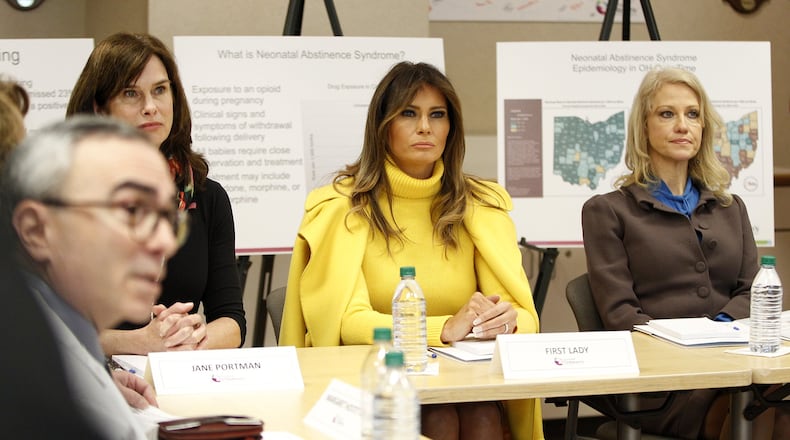RELATED: Opioid epidemic has a ‘ripple effect’ as it impacts everyone
“It makes you realize you can’t just let this become the norm,” said Wexelblatt, regional director of newborn services at Cincinnati Children’s Perinatal Institute. “It’s something you got to work on. This is not okay.”
That is what Wexelblatt and others told First Lady Melania Trump and Jane Portman, the wife of U.S. Sen. Rob Portman, when they visited the hospital earlier this month as they discussed the hospital’s neonatal care with those babies born with withdrawal symptoms. President Trump declared in October the opioid crisis in the country as a public health emergency.
Over the past eight years, the region has seen an 8 1/2-fold increase in the rate of newborns exposed to opioids during pregnancy, according to Cincinnati Children’s. That means on average, 25,000 babies a year are born with opioid withdrawal.
“No one chose to be an addict, no one wants to be an addict, and we have to treat it like a disease,” said Wexelblatt.
It's believed that customer satisfaction surveys, which according to Time and CBS News reports tie hospitals to Medicaid and Medicare reimbursements, has led physicians to lean to prescribing pain medicine, much of which is opioid-based, over helping patients with pain management.
Wexelblatt said that right now there’s a “big push” to place people in the mindset that it’s okay to have a little bit of pain.
“The big push is to figure out is pain acceptable when you’re having a surgical procedure,” he said. “A decrease in these prescriptions is a good start, and finding other pain medications that’s non-addictive is another great move.”
Last September, the trade group Pharmaceutical Research and Manufacturers of America announced it would support policies limiting the supply of opioids to seven days.
“Too often, individuals receive a 30-day supply of opioid medicines for minor treatments or short-term pain,” said PhRMA president and CEO Stephen J. Ubl. “Overprescribing and dispensing can lead to patients taking opioids longer than necessary or to excess pills falling into the wrong hands.”
As the opioid crisis has exploded across the country, there is a correlation with the increase of babies born with drug withdrawal, said Dr. Stephen Patrick, Assistant Professor of Pediatrics and Health Policy at Vanderbilt University School of Medicine. When pregnant mothers become addicted to opioids, or heroin, their babies will often be born with withdrawal symptoms, which Patrick describes those infants "as a colicky baby times five."
“It’s a baby that’s very fussy, they may have tremors, jitteriness, sometimes they can have difficulty feeding and may require a feeding tube,” Patrick said. “And less commonly they could have seizures.”
A lot of times babies born with drug withdrawal symptoms are placed into a neonatal intensive care unit, which is not always ideal because it’s “a loud environment” and chaotic, and “not a great place to go to if you’re going through drug withdrawal.”
Patrick said keeping the mother and baby together after birth and promoting things that don’t require medicine “seems to control the symptoms that the babies have to require less medicine,” but sometimes withdrawal is “severe enough” where doctors have to treat it with a medication, such as methadone or morphine.
,” Patrick said. “We know that improves outcomes for the mother, they’re less likely to get hepatitis C, and for the baby they’re more likely to go to term and have higher birth rates.”
Patrick said it's difficult to find access for addiction treatment for women, but the Comprehensive Addiction and Recovery Act of 2016, which Ohio Sen. Rob Portman, R-Cincinnati, was one of the original five co-sponsors, helps with that.
In that bill, there’s special care for pregnant women with opioid use disorder, and it expands medication-assisted treatment.
“The heroin and opioid epidemic is having a devastating impact on public health and safety in communities in Ohio and across the United States,” said Portman, adding that drug overdoses kill more people than automobile accidents. “Addiction is a treatable disease, but only 10 percent of those who need treatment receive it. Discoveries in the science of addiction have led to advances in drug abuse treatment that can help people stop abusing drugs and lead productive lives.”
About the Author

